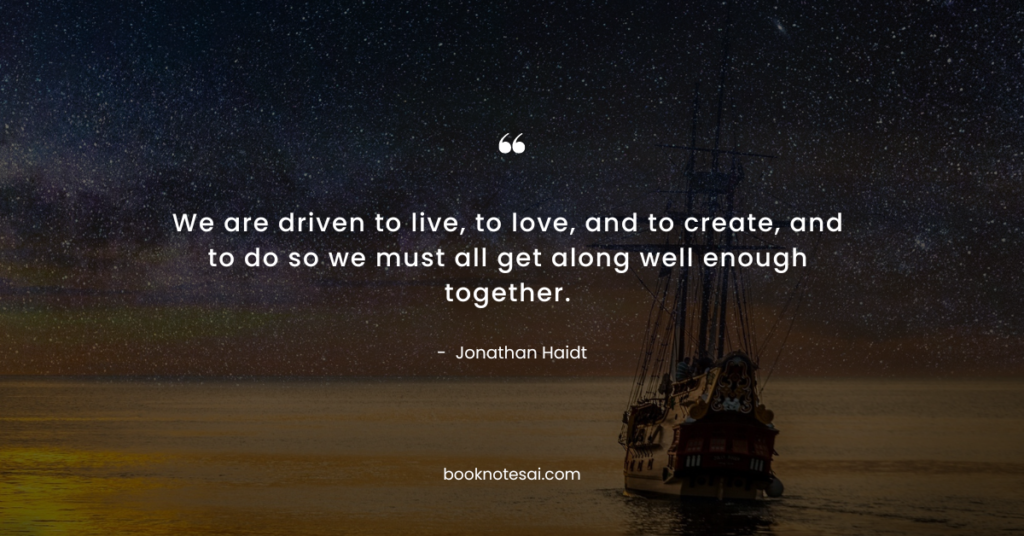Listen To This Post
The Righteous Mind: Why Good People Are Divided by Politics and Religion Summary: Exploring the Divides Among Good People.

This is a book summary for The Righteous Mind by Jonathan Haidt. The essential information is structured to be straightforward, useful, and valuable, all while helping you save plenty of time.
Introduction: Why this book?
- Delve into the intricacies of human morality and the underlying reasons behind our political and religious divides.
- Understand why investing time in comprehending the concepts of The Righteous Mind by Jonathan Haidt is crucial for navigating today’s polarized world.
The Righteous Mind Summary:
- Jonathan Haidt’s The Righteous Mind explores the psychological foundations of morality and sheds light on why people across different cultures and ideologies often clash.
- Through vivid examples and insightful analysis, Haidt reveals how moral intuitions, rather than rationality, drive our judgments and decisions.
- The book underscores the importance of understanding diverse moral frameworks to foster empathy, dialogue, and cooperation in society.
- Haidt argues for a more holistic approach to moral psychology that acknowledges the complexity and diversity of human values.
- Ultimately, The Righteous Mind invites readers to transcend their moral biases and engage in constructive dialogue to bridge societal divides.
💡 5 Big Ideas
- The Moral Mind’s Foundations: Haidt explores how our moral judgments are shaped by evolutionary processes, social intuitionism, and cultural influences.
Understanding these foundations helps us appreciate the diversity of moral perspectives and cultivate empathy. - The Role of Intuition in Morality: Haidt emphasizes the primacy of intuition over reason in moral decision-making.
By recognizing the power of intuitive judgments, we can better understand our own moral inclinations and those of others. - The Moral Matrix: Haidt introduces the concept of the “moral matrix,” wherein individuals perceive the world through different moral lenses shaped by their upbringing and social environment.
Acknowledging this diversity enables us to engage in more productive discourse. - The Importance of Group Dynamics: Haidt highlights the significance of group cohesion and identity in shaping moral judgments.
By recognizing the influence of group dynamics, we can foster a sense of belonging and understanding across diverse communities. - Building Bridges Across Divides: Haidt encourages us to transcend our moral tribalism and engage in respectful dialogue with those holding opposing viewpoints.
By embracing intellectual humility and empathy, we can bridge ideological divides and work towards common goals.
In summary, The Righteous Mind underscores the complexity of human morality and advocates for a more nuanced understanding of moral psychology to promote mutual understanding and cooperation in society.
Powerful Quotes
- “Morality binds and blinds.”
This quote emphasizes how our moral convictions can both unite us with like-minded individuals and blind us to alternative perspectives. It highlights the dual nature of morality in shaping human interactions. - “We are all stuck with the psychology we inherited from our ancestors, and yet we have the power to transcend it.”
This quote encourages introspection and acknowledges our capacity to overcome innate biases and prejudices through self-awareness and personal growth. - “The righteous mind is like a tongue with six taste receptors.”
This analogy illustrates the multifaceted nature of human morality, which encompasses diverse moral foundations and intuitions. - “We humans have an extraordinary ability to care about things beyond ourselves, to circle around those things with other people, and in the process to bind ourselves together.”
This quote underscores the power of shared values and collective identity in fostering social cohesion and cooperation. - “Morality is not just about how we treat each other (as most liberals think); it is also about binding groups together, supporting essential institutions, and living in a sanctified and noble way.”
This quote highlights the broader scope of morality beyond individual interactions, encompassing the preservation of societal norms and institutions. - “We are conditional hive creatures, ultrasocial mammals, who are living quasi-tribal lives.”
This quote elucidates our inherent social nature and the evolutionary origins of human cooperation and group identity. - “We are driven to live, to love, and to create, and to do so we must all get along well enough together.”
This quote underscores the fundamental human need for social connection and cooperation in fulfilling our shared aspirations. - “Morality binds and blinds. It binds us into ideological teams that fight each other as though the fate of the world depended on our side winning each battle.”
This quote emphasizes how moral convictions can foster group identity and cohesion while also blinding us to alternative perspectives and inhibiting constructive dialogue. - “A commitment to the sacred values of the left or the right blinds people to the ‘objective truth’ that’s staring them in the face.”
This quote highlights how ideological commitments can distort our perception of reality and impede rational discourse. - “The human mind is a story processor, not a logic processor.”
This quote underscores the role of narrative and emotion in shaping human beliefs and judgments, highlighting the importance of storytelling in moral persuasion and communication.
One Reason To Read This Book:
By delving into The Righteous Mind by Jonathan Haidt, you gain invaluable insights into the complexities of human morality and the psychological underpinnings of our moral judgments.
Who should I recommend The Righteous Mind Summary to?
Anyone interested in understanding the psychological roots of political and religious divisions will find The Righteous Mind summary illuminating.
Professionals in fields such as psychology, sociology, and political science can benefit from the nuanced insights offered by Jonathan Haidt.
Recommendations:
- Explore Jonathan Haidt’s other works, such as “The Happiness Hypothesis” and “The Coddling of the American Mind,” for further exploration of related topics.
- Dive into research articles on moral psychology and political polarization to deepen your understanding of the subjects discussed in The Righteous Mind.
This summary is designed to offer a complimentary exploration of the reviewed title The Righteous Mind, offering valuable insights. For a richer understanding, we recommend delving into the full book.


